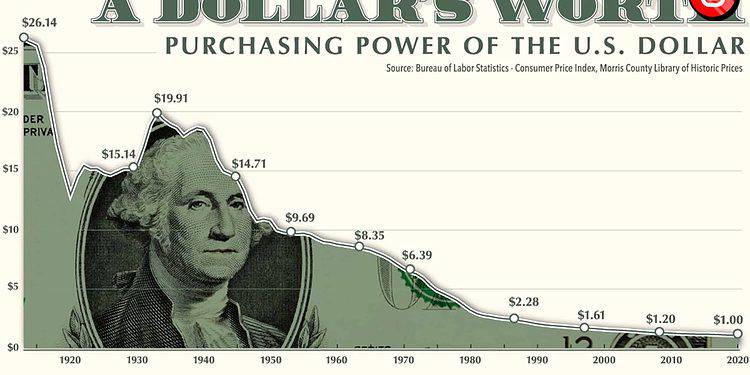Article contributed by Ren & Heinrich. Follow them on Medium here.
(Image: Purchasing Power of the US Dollar 1913–2020, Source: visualcapitalist.com)
I was interested in what academic sources have to say about this. During my research, I came across 7 papers published in 2021 and 2022.
Here is the short version.
Findings: 4 out of 7 academic papers say that Bitcoin is an inflation hedge
- Studies show mixed results. 4 out of 7 research papers say that Bitcoin can be used to hedge against inflation. [1] [2] [3] [4]
- One paper says that results were inconclusive since Bitcoin only provided effective protection against inflation for a relatively short time in the period under review. [5]
- Two studies concluded that Bitcoin cannot be used as a hedge for forward inflation expectations. [6] [7]
- The main reason given why Bitcoin does not offer protection against inflation is the fact that its contentedness with macro markets has increased in recent years. One paper says that this is likely due to the fact that there is greater participation by professional and institutional traders including hedge funds. [6]
- Several papers point out, that at the beginning of the pandemic, BTC performed well as a hedge against inflation but lost its advantage during 2021.[4] [5] [7]
Criticism: Reference time and observation periods are too short
- The majority of institutional investors only started to pay attention to Bitcoin after 2017. The period of mass adoption is correspondingly short, which makes it difficult to make reliable statements about whether BTC represents protection against inflation.
- Two of the studies that see BTC as an inflation hedge have relatively short observation periods of 3 and 2 years, respectively.
- I covered the most recent research, which means I only researched papers published in 2021 and 2022. However, during the 2nd quarter of 2022, many countries globally experienced high inflation due to various reasons, while Bitcoin price stayed relatively low. This interesting time period is not included in the research.
- Bitcoin has a multi-year cycle. The time period in which the pandemic happened coincides with Bitcoin’s cycle where Bitcoin price was increasing. To get a better understanding, more studies are needed in the future.
- Some studies’ results only apply to certain countries and cannot be generalized to the whole world.
Conclusion — Bitcoin is a great inflation hedge for those who can wait
Alright, so what conclusion can we draw from this? Not too much new to be honest.
Depending on the period examined, Bitcoin is sometimes seen as a better, sometimes as a worse hedge against inflation. A comparison to gold is inevitably made in some studies.
Gold price in USD from 2008 to 2022. Source: https://goldprice.org/spot-gold.html
For many decades, gold has been the traditional investment to hedge against inflation and uncertain times. And not without good reason, as the above chart shows.
Since 2009, the US dollar has lost 28% of its purchasing power and the euro 22%. In contrast, the price of gold in USD and EUR more than doubled over the same period.
Despite all the volatility, this performance is easily overshadowed by Bitcoin. While the occasional BTC price slumps are painful, they will be more than outweighed by price developments in the medium to long term. So, in my opinion, owning Bitcoin is good protection against inflation.
You just have to be able to wait long enough.
References
[1] S. Choi and J. Shin, “Bitcoin: An inflation hedge but not a safe haven,” Finance Research Letters, vol. 46, May 2022, doi: https://doi.org/10.1016/j.frl.2021.102379.
[2] P. Phochanachan, N. Pirabun, S. Leurcharusmee, and W. Yamaka, “Do Bitcoin and Traditional Financial Assets Act as an Inflation Hedge during Stable and Turbulent Markets? Evidence from High Cryptocurrency Adoption Countries,” Axioms, vol. 11, no. 7, Art. no. 7, Jul. 2022, doi: 10.3390/axioms11070339.
[3] B. M. Blau, T. G. Griffith, and R. J. Whitby, “Inflation and Bitcoin: A descriptive time-series analysis,” Economics Letters, vol. 203, p. 109848, Jun. 2021, doi: 10.1016/j.econlet.2021.109848.
[4] C. Wijaya and M. Ulpah, “The Analysis of the Roles of Bitcoin, Ethereum, and Gold as Hedge and Safe-Haven Assets on the Indonesian Stock Market before and during the COVID-19 Pandemic,” The Indonesian Capital Market Review, vol. 14, no. 1, Jan. 2022, doi: 10.21002/icmr.v14i1.1140.
[5] D. Roberto Curciarello, “Title: Does Bitcoin hedge inflation risk? A multivariate time series analysis.” Accessed: Aug. 12, 2022. [Online]. Available: https://gupea.ub.gu.se/handle/2077/72396
[6] S. A. Basher and P. Sadorsky, “Forecasting Bitcoin price direction with random forests: How important are interest rates, inflation, and market volatility?,” Machine Learning with Applications, vol. 9, p. 100355, Sep. 2022, doi: 10.1016/j.mlwa.2022.100355.
[7] T. Conlon, S. Corbet, and R. J. McGee, “Inflation and cryptocurrencies revisited: A time-scale analysis,” Economics Letters, vol. 206, p. 109996, Sep. 2021, doi: 10.1016/j.econlet.2021.109996.







